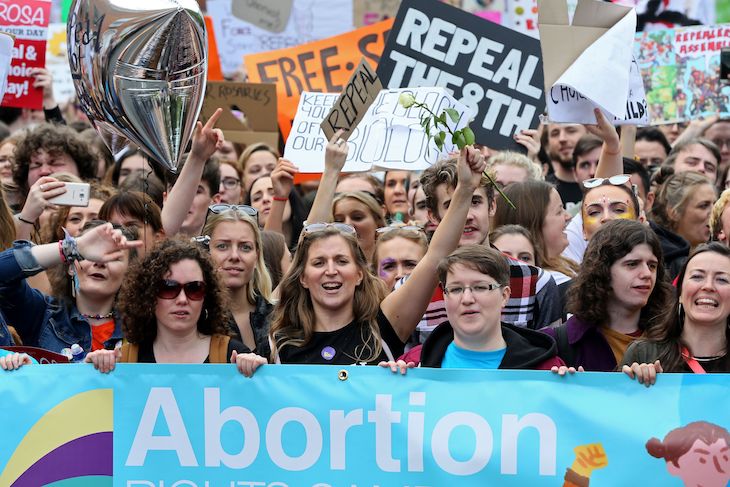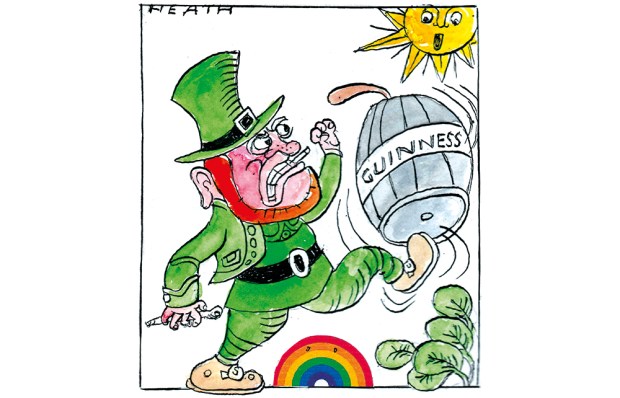The Irish referendum on abortion takes place in just under three weeks’ time, and while the polls suggest a hefty majority in favour, the narrative of inexorable change towards a more liberal Ireland sometimes goes off script. At a feminist forum last month, the anarchic grande dame of Irish republican feminism, Nell McCafferty, 74, brooded out loud: ‘I’ve been trying to make up my mind on abortion. Is it the killing of a human being?’ She couldn’t answer. ‘But it’s not that I’m unable — I am unwilling to face some of the facts about abortion.’
You can’t imagine that kind of plain speaking in Britain. Yet the debate in Ireland revolves around first principles to an extent that would be impossible here. You can see it in the signs on street posts where, traditionally, political campaigns are visibly fought out. The pro-choice posters range from ‘Sometimes a private choice needs public support’ to, more combatively, ‘Our Bodies, Our Choice, Vote YES’.
On the other side, the pro-life campaign focuses squarely on the foetus or child. One, showing a grainy scan reads: ‘I’m nine weeks old, I can yawn and kick… don’t repeal me.’ Lots of these have been torn down.
The referendum on abortion is, more precisely, about repealing the Eighth Amendment to the Constitution, 40.3.3, which protects ‘the unborn’ with due regard to the equal right to life of the mother. That apparently unambiguous provision has in practice been modified to allow for abortion where the mother is at risk of suicide or physically at risk in pregnancy. In fact one former head of the Irish institute of obstetricians and gynaecologists, who opposes repeal, declared that the Eighth Amendment had never prevented him from acting in the mother’s interests, including abortion in one case.
Yet repealing the amendment would be far more radical than that. It would bring Ireland in line with Britain in terms of abortion law, and in some respects go further.
Under legislative proposals framed by the Fine Gael-led government, there would be abortion, as in Britain, up to viability (around 23 weeks) if two doctors say the pregnancy would harm the mental or physical health of the woman. We know how that works out in practice: no abortion is denied. It also appears to allow for abortion on the basis of disability. But unlike Britain, there would be access to abortion without the formality of doctors’ signatures up to 12 weeks, with 72 hours for reflection.
For backers of repeal such as the Taoiseach, Leo Varadkar, it is a matter of acknowledging realities, namely that some 3,000-4,000 women a year travel to Britain for an abortion, with others obtaining abortifacients online. ‘In the Ireland of 2018, we still export our problems and import our solutions,’ he said. Repeal is, in this reading, about bringing Ireland into line with modernity. Abortion is, like gay marriage, emblematic of moving forward from a Catholic past.
Pro-lifers, however, decline to have the debate framed in terms of progress towards international norms. John Waters, a polemicist on the pro-life side (and former partner of singer Sinead O’Connor), declared: ‘We are supposed to be the backward ones, but in fact we are ahead of history… to be one day — if we hold our nerve and damp down the crazy false progressivism that assaults us — vindicated by history and medical science. Because one day — for certain — the world will arrive at a consensual consciousness about unborn boys and girls: that they are as human as 6ft 3in rugby players.
What’s notable about the campaign is it’s an almost entirely secular debate. The Catholic Church is absent from the fight to an extent that would have been hard to imagine in 1983, though it has made clear its support for keeping the amendment — as indeed have the leaders of the Protestant churches.
This isn’t a debate of men against women; it’s women against women with men on both sides. The pro-life meetings are fronted by women, including pregnant women and women who have had hard-case pregnancies. The repeal side is, however, ahead with younger voters, and urban ones. The last repeal public demonstration was pretty much identical with global #MeToo marches, including the slogans on the placards: ‘Keep your dirty laws off my silky drawers’, et al.
Much of the vigour of the Together for Yes repeal campaign is online; it, too, is galvanising younger voters abroad in the #HomeToVote campaign, which saw thousands return to participate in the gay marriage referendum. What’s interesting, however, is the extent to which the repeal side appears to shun engagement with opponents online — one way is via the Twitter Repeal Shield — which is troubling more generally in its implications for democratic debate.
The most recent Irish Times/Ipsos poll on voters’ intentions last week put the Yes campaign well ahead, by just over two-thirds among those likely to vote. To a remarkable extent, the political classes are squarely in favour of repeal, from the Taoiseach to Sinn Fein at the other end of the spectrum: one of the more surreal elements of Gerry Adams’s resignation speech to his party conference was when he was interrupted by applause for supporting abolition of the Eighth Amendment; Adams, a late-life feminist, beamed. Micheál Martin, leader of the normally socially conservative Fianna Fáil party, has declared for repeal. Yet Leo Varadkar was famously pro-foetus before the election; ditto the Health Minister Simon Harris and indeed most others in the two big parties who now back repeal. The sole party actually against Repeal is the tiny breakaway Renua, which hasn’t any MPs.
The same goes for the press. Rather than list the pundits for abortion, it’s easier to name two against: David Quinn on the Irish Sunday Times and Breda O’Brien on the Irish Times. There’s another factor: a Newstalk radio station analysis of the voting register in 2016 suggests that, in comparison with the census, there are about 488,000 more people on the register than might be expected. This could affect the outcome.
And although the Irish Times editorial on its own poll observed that ‘the prize is in sight’, there just might be an upset. Elsewhere, we’ve seen consensus among right-thinking people in the political classes before, followed by an unexpected result.
Got something to add? Join the discussion and comment below.
Get 10 issues for just $10
Subscribe to The Spectator Australia today for the next 10 magazine issues, plus full online access, for just $10.
You might disagree with half of it, but you’ll enjoy reading all of it. Try your first month for free, then just $2 a week for the remainder of your first year.














Comments
Don't miss out
Join the conversation with other Spectator Australia readers. Subscribe to leave a comment.
SUBSCRIBEAlready a subscriber? Log in